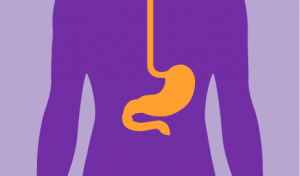 Find out more about stomach cancer, including how common it is and ways to reduce your risk.
Find out more about stomach cancer, including how common it is and ways to reduce your risk.
Stomach cancer is not very common in the UK. In 2017, 6,361 cases of stomach cancer were diagnosed*.
The stomach is part of the digestive system between the food pipe (oesophagus) and the bowel that helps to mix up and break down food.
Most stomach cancers develop in the lining of the stomach. There are two types of stomach cancer – cardia (at the top of the stomach where it meets the oesophagus) and non-cardia (the rest of the stomach).
As with all cancers, the risk of developing stomach cancer depends on a number of factors and varies from person to person.
> Drinking more than three alcoholic drinks a day
> Being overweight or obese
> Eating a diet that contains a lot of salt-preserved foods
> Smoking or using tobacco
The good news is that there are steps you can take to reduce your risk. These are based on research from our Continuous Update Project.
There’s strong evidence that drinking about three or more alcoholic drinks per day is a cause of stomach cancer. To reduce cancer risk, we recommend not drinking alcohol at all. If you do drink, limit alcoholic drinks to no more than seven drinks a week, spread over at least three days.
Find out more about the link between alcohol and cancer or find out how many calories are in alcoholic drinks by using our alcohol calorie calculator. Or why not browse our healthy recipes for some inspirational mocktail ideas?
Strong evidence shows that being overweight or obese is a cause of cardia stomach cancer. Use our body mass index calculator to find out if you are a healthy weight for your height and visit our weight and cancer prevention page for tips to keep your weight healthy.
There’s strong evidence that eating foods preserved by salting increases the risk of stomach cancer. This mainly relates to salted or dried fish and pickled vegetables eaten in east Asia, rather than foods commonly found in the UK.
The evidence linking added salt as a cause of stomach cancer has become less strong, although we cannot rule out this link. This is partly because it is so difficult to measure how much salt we eat.
However, eating too much salt is still a health concern, so we recommend limiting the amount of salt in your diet to less than 6g per day – about one teaspoon. Try our healthy recipes, which are all low in salt.
If you do smoke, stopping smoking will reduce your risk. The NHS stop smoking service can help you quit.
> Visit NHS Choices to find out about stomach cancer symptoms and treatment